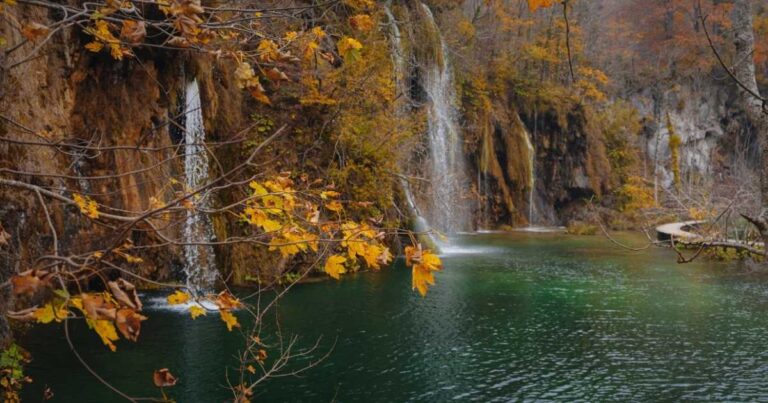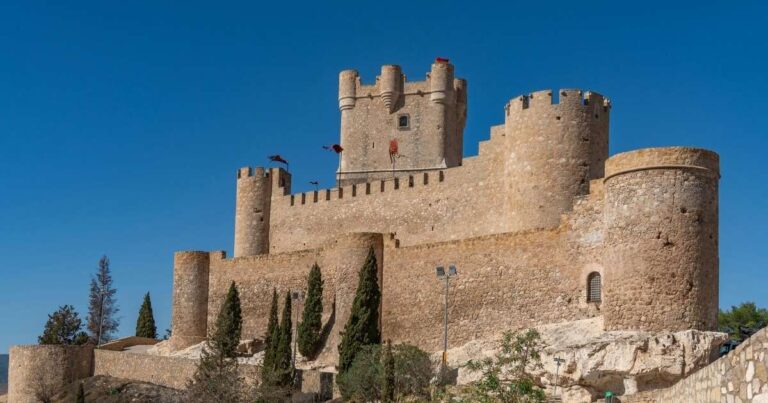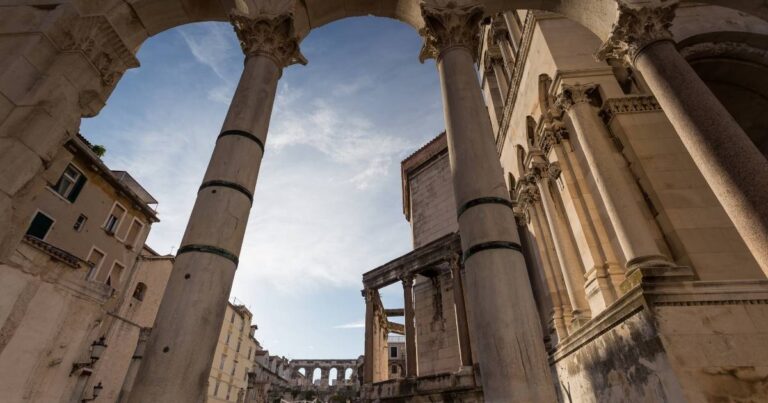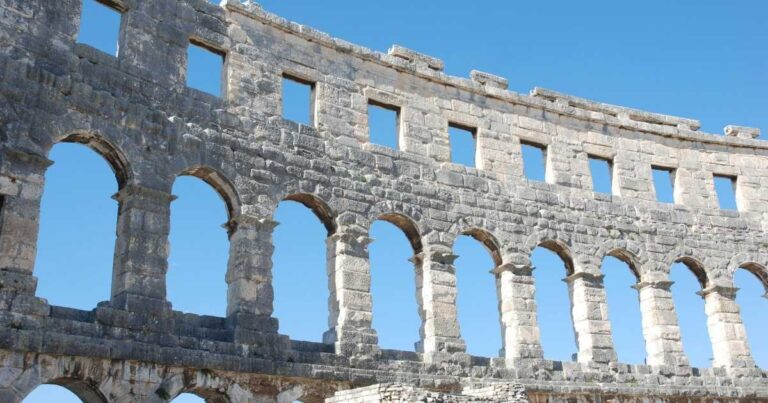Brief Overview of Croatia’s Rich Cultural Landscape
Croatia, a country nestled along the stunning Adriatic Sea, offers a rich tapestry of history, culture, and traditions. Croatia boasts an impressive cultural landscape shaped by centuries of diverse influences, from its medieval cities to its scenic coastal towns. This beautiful nation has seen a range of rulers, empires, and civilizations, each leaving its mark on the land and its people.
Whether you’re walking through the ancient streets of Dubrovnik or exploring the rural heartland of Slavonia, Croatia’s cultural heritage is palpable at every turn. Croatia’s culture reflects its geographical position at the crossroads of Central Europe, the Mediterranean, and the Balkans, which has allowed it to develop a unique blend of influences.
Importance of Understanding Local Traditions and Heritage
Understanding local traditions and heritage is crucial to appreciating Croatia’s identity and the way of life of its people. Traditions provide a sense of continuity and help preserve the community’s collective memory. For locals and visitors, immersing oneself in the culture can lead to a deeper connection with the land and the people who call it home.
Learning about Croatian customs, festivals, and cuisine can give insights into the values, history, and societal dynamics that shape the country today. In a rapidly changing world, understanding cultural heritage helps us preserve the richness of the past while fostering respect for different ways of life.
Purpose of the Blog Post: To Explore the Unique Aspects of Croatian Culture
This blog post aims to take you through Croatia’s vibrant cultural landscape. From historical influences that shaped the country’s identity to lively festivals that bring tradition to life, we’ll explore the customs, cuisine, and celebrations that make Croatia unique. Whether you’re planning a visit or simply fascinated by Croatia’s culture, this post offers valuable insights into the local way of life.
Historical Influences on Croatian Culture
Overview of Croatia’s Historical Background
Various civilizations and empires have shaped Croatia’s culture over the centuries. Croatia’s past is rich and diverse from the early days of Greek and Roman influence to its role in the Austro-Hungarian Empire. Understanding these historical layers helps us appreciate the nuances of Croatian traditions and their impact on modern-day culture.
1. Ancient Civilizations and Their Impact
The earliest civilizations to influence Croatia were the Greeks, who established colonies along the coast, especially in the region of Istria. The Roman Empire later left its mark on Croatia, particularly with the construction of cities like Split and Pula. Roman architecture, language, and governance continue to influence Croatian society today.
2. The Influence of the Roman Empire
Roman rule brought urbanization and technological advancements to Croatia. The ruins of Roman structures, such as Diocletian’s Palace in Split, serve as a reminder of the empire’s lasting legacy. The Croatian language also has Latin roots, further cementing the impact of the Roman Empire on the nation’s culture.
3. The Role of the Austro-Hungarian Empire
The Austro-Hungarian Empire ruled much of Croatia for over a century, leaving behind an architectural legacy, particularly in cities like Zagreb. The empire’s influence is still felt in Croatian traditions, such as music, cuisine, and the unique blend of Central European and Mediterranean influences that define Croatian culture today.
How History Shapes Modern Croatian Identity
Modern Croatia is a mix of these diverse influences, creating a unique identity that is both Mediterranean and Central European. Croatia’s rich cultural heritage is evident in its language, architecture, and daily life, and it has a deep respect for tradition combined with a modern outlook. The historical experiences of war, independence, and resilience also significantly shape the national character, making Croatians proud of their rich history and cultural traditions.
Traditional Croatian Festivals and Celebrations
Overview of Key Festivals
Croatia’s festivals and celebrations directly reflect its cultural richness and diversity. They celebrate everything from religious holidays to historic events, providing a window into the country’s soul. Here are some of the most popular and historically significant festivals in Croatia:
1. Dubrovnik Summer Festival
One of Croatia’s most famous festivals, the Dubrovnik Summer Festival, takes place annually in the UNESCO-listed city of Dubrovnik. With its open-air performances of classical music, theater, and dance, this event highlights Croatia’s deep artistic traditions. It’s an essential experience for anyone looking to witness the cultural heartbeat of the country.
2. Sinjska Alka
The Sinjska Alka is a unique festival held in the town of Sinj. Participants ride horses and try to pierce a hanging metal ring with a lance. This centuries-old tradition commemorates the locals’ victory over the Ottoman Empire in 1715. It’s a powerful symbol of Croatian pride and heritage, with locals and visitors celebrating their ancestors’ courage and resilience.
3. Carnival Celebrations
Carnival in Croatia, particularly in the town of Rijeka, is a colorful and lively event that marks the beginning of Lent. Participants dress in elaborate costumes and masks, often representing traditional folklore figures. This festival offers a glimpse into the country’s blend of Mediterranean and Slavic traditions.
Significance of These Festivals in Preserving Culture
Croatian festivals play a pivotal role in preserving the nation’s heritage. They offer an opportunity for younger generations to learn about and participate in age-old traditions, ensuring that these practices continue to thrive. These festivals are not just about celebration; they are also a way for Croatians to honor their history and cultural roots.
Unique Customs and Practices Associated with Each Festival
Distinct customs and practices mark each festival. For example, the Dubrovnik Summer Festival combines world-class performances with the stunning backdrop of medieval walls. The Sinjska Alka is a living history lesson, showcasing the town’s martial tradition. And the Carnival celebrations feature masks that have been passed down for generations, each symbolizing an important aspect of Croatian folklore.
Croatian Cuisine: A Taste of Tradition
Introduction to Traditional Croatian Dishes
Croatian cuisine is as diverse as the country itself, offering a combination of Mediterranean, Central European, and Balkan flavors. The country’s culinary landscape is shaped by its geography, with coastal areas focusing on seafood and inland regions offering heartier, meat-based dishes. Food is central to Croatian culture and often plays a key role in family gatherings, celebrations, and holidays.
Regional Variations in Cuisine
1. Coastal vs. Inland Specialties
Croatia’s coastal regions, especially Dalmatia, are known for their seafood, with dishes like grilled fish, octopus salad, and black risotto made with cuttlefish ink. The inland regions, such as Slavonia, offer hearty fare like kulen (a spicy sausage) and sarma (stuffed cabbage rolls).
2. Influence of Neighboring Countries
Croatian cuisine has been influenced by its neighbors, such as Italy, Hungary, and Serbia. This is evident in dishes like pasticada (a slow-cooked beef stew), which bears similarities to Italian and Hungarian stews. Mediterranean flavors heavily influence the use of olive oil, garlic, and herbs, while the use of paprika and meats reflects Central European tastes.
Importance of Food in Cultural Gatherings and Celebrations
Food is essential to Croatian culture, bringing families and communities together. Spending hours preparing meals for festivals, family gatherings, and special occasions is common. Traditional recipes are passed down through generations, and cooking is often seen as an expression of love and care. Sharing food is not just about nourishment; it’s about maintaining connections to the past and celebrating the present.
Conclusion
Recap of the Richness of Croatian Culture and Traditions
Croatia’s culture is a beautiful blend of history, tradition, and modern influences. From its ancient roots in Roman and Greek civilizations to its contemporary vibrancy, Croatian culture is rich in diversity and meaning. The festivals, cuisine, and historical landmarks all contribute to a unique and unforgettable cultural experience.
Encouragement to Explore and Experience These Aspects Firsthand
If you’re planning a visit to Croatia, don’t just focus on the beautiful landscapes and beaches. Take time to explore the culture—the festivals, the food, the traditions. Immerse yourself in the local way of life, and you’ll better understand what makes this country so special.
Final Thoughts on the Importance of Cultural Heritage in Fostering Understanding and Appreciation
In today’s globalized world, understanding and appreciating cultural heritage is more important than ever. Croatia’s rich traditions offer valuable insights into the country’s values, history, and identity. By embracing and celebrating these traditions, we can foster greater respect for cultural diversity and build connections that transcend borders.
FAQs
What are the must-see festivals in Croatia?
Some of the must-see festivals include the Dubrovnik Summer Festival, Sinjska Alka, and Carnival celebrations in Rijeka. Each offers a unique glimpse into Croatia’s rich cultural history.
How does Croatian cuisine differ by region?
Coastal regions focus on seafood, while inland areas are known for heartier meat-based dishes like kulen and sarma. The Mediterranean and Central European regions evidently influence Croatian cuisine.
What is the significance of the Sinjska Alka festival?
The Sinjska Alka is a historic event commemorating the victory of the locals over the Ottoman Empire in 1715. It’s a symbol of Croatian bravery and heritage.
Why is food so important in Croatian culture?
Food is central to family and community life in Croatia. It’s a way of preserving tradition, celebrating milestones, and sharing love and connection with others.
How can I experience traditional Croatian culture while visiting?
Attend local festivals, explore historical sites like Diocletian’s Palace, try traditional dishes, and immerse yourself in the customs and lifestyle of Croatian towns and cities.







